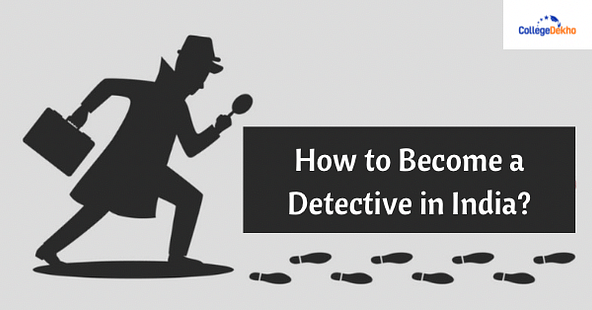Becoming a Detective requires certain skills and qualifications that are mandatory for this profession. Find all the details about how to become a detective in India in this article.
- Who is a Detective?
- Understanding the Duties and Responsibilities of a Detective in India
- How to Become a Detective in India?
- Step-by-Step Guide to Become a Detective in India
- Skills Required to Become a Detective in India
- Difference Between an Investigator and a Detective
- Career Scope of a Detective in India
- Top Recruiters and Career Opportunities for a Detective in India
- Salary of a Detective in India

To become a Detective in India, interested candidates need to know the path they must take with respect to academics. If you are someone who is fascinated by the stories of Sherlock Holmes and wish to follow a similar career, it is mandatory to know the steps you need to take to become a Detective in India. While this knowledge will help you save time, it will also help you decide the most ideal way to accomplish your goals.
Candidates searching for how to become a Detective in India will find all the relevant details in this article. Comprehensive information is provided on how to build a career as a detective, the eligibility criteria, the duties of a detective, etc.
Who is a Detective?
A detective is an individual who works as an investigator - a member of the law enforcement agency. They are often responsible for collecting information to solve crimes by indulging with witnesses and informants, searching physical evidence, and collecting and organizing records in databases. Most of the detectives in India are employed in criminal investigation departments. Thus, they get to work with police officers, victims and forensic investigators. However, some detectives work privately and are not a part of any official law enforcement.
While police officers can become detectives by passing a test, college graduates have a different trajectory to become detectives in India. Some say detectives need different training and skills than uniformed officers, while others argue that previous police experience makes a detective better at the job. A detective is a specialist who is responsible for investigating severe, complex and special cases related to murders, drugs, child protection, robbery, homicide, cybercrime, fraud, domestic violence, counter-terrorism etc. The position of a detective is considered not as a rank but as a title that demonstrates the skills, nature of work, training and experience required in this field.
Understanding the Duties and Responsibilities of a Detective in India
Detectives can be regarded as law enforcement professionals who specialize in investigating crimes by gathering evidence to solve the cases. They have an essential role to play in maintaining public safety and upholding the principle of justice.
To understand the work and responsibilities of a detective in India, please refer to the information provided below:
- Investigation and Surveillance : Detectives play a crucial role in investigations, utilizing methods like surveillance, interviews, and research to gather evidence.
- Case Management : They manage diverse cases, including criminal activities and missing persons, maintaining detailed records for legal purposes.
- Interrogation and Interview : Detectives interview witnesses and suspects, employing effective questioning techniques to extract relevant information.
- Forensic Analysis : They collaborate with forensic experts, integrating physical evidence analysis into their investigations.
- Report Writing & Documentation : Proficient in report writing, detectives ensure accuracy and adherence to legal requirements in their documentation.
- Cooperation with Law Enforcement Agencies : They cooperate with various law enforcement agencies, specializing in units like homicide or cybercrime.
- Testifying in Court : Detectives may testify in court, presenting findings, offering expert opinions, and handling cross-examinations with strong communication skills and credibility.
How to Become a Detective in India?
To become a detective in India, there are several ways a candidate can pursue. The very first one is to qualify class 12th and take up a graduation degree related to detective, criminal law or forensic science. Numerous colleges and universities in India offer UG courses that help students in starting their careers as detectives. After completing the graduation degree, one has to gain relevant experience by joining internships and projects under law firms, police departments, criminal departments or even private firms.
Earning a name and respect as a detective is not a cakewalk, years and years of experience and success in case solving helps one to become a good and popular detective in India. This is a particularly challenging career but with the right direction, one can easily become a detective in India.
Step-by-Step Guide to Become a Detective in India
Students from all educational backgrounds are eligible to become detectives in India. We have provided a step-by-step guide to become a Detective in India wherein one can get information about degrees, skills, training and work experience.
Step 1: Obtain Educational Qualifications
To pursue a career as a detective in India, it's crucial to have a solid educational background. Typically, a minimum of a bachelor’s degree in relevant fields such as criminal justice, criminology, forensic science, or sociology is required. Consider enhancing your expertise by pursuing a master’s degree or obtaining specialized certifications in specific investigative areas.
Some courses that can help students begin their career as a detective are mentioned below in the table. According to one’s interest, eligibility and skill set, they can choose either of them and take the first step to becoming a detective in India.
Course Name | Course Duration | Eligibility Criteria |
|---|---|---|
Bachelor of Criminology | 3 Years | 10+2 in any stream |
Diploma in Private Investigation | 1 Year | 10+2 in any stream |
Bachelor of Forensic Science | 3 Years | 10+2 in any Science stream |
Certificate in Cyber Forensics | 6 Months | 10+2 in any stream |
Diploma in Criminal Law | 1 Year | Bachelor’s degree in any discipline |
Certificate Course in Crime Scene Investigation | 6 Months | 10+2 in any stream |
Post Graduate Diploma in Forensic Science | 1 Year | Bachelor’s degree in Science stream or related field |
Step 2: Acquire Practical Experience
Gaining hands-on experience is vital for success in the field of detective work. Get work experience in related areas like law enforcement agencies, private investigation firms, or government organizations to gain insights into investigative techniques, evidence collection, and criminal justice processes.
Step 3: Cultivate Essential Skills
To excel as a detective, candidates need to develop a specific skill set including analytical skills, communication skills, research skills, technological proficiency, and discretion with ethical conduct.
Step 4: Join Law Enforcement or Private Detective Agencies
Initiate your detective career by joining law enforcement agencies such as the police or intelligence departments. Successfully clearing required examinations, physical fitness tests, and interviews is crucial. Serving in law enforcement provides valuable field experience and opportunities for specialization.
Alternatively, consider joining private detective agencies, which often offer chances for aspiring detectives to gain practical experience across various cases. Private detectives may specialize in areas like corporate investigations, matrimonial cases, or financial fraud, among others.
Also Read: How to Become a Crime Investigating Officer?Skills Required to Become a Detective in India
Achieving success as a detective requires a deep grasp of the field and the acquisition of both soft and hard professional skills. Here are some essential skills crucial for advancing in a detective's career:
- Analytical Skills : Detectives need the ability to analyze intricate information, connect dots, and identify patterns for effective case resolution.
- Communication Skills : Strong communication skills are essential for interviewing witnesses, interrogating suspects, and collaborating with professionals in the criminal justice system.
- Research Skills : Proficiency in conducting thorough research, utilizing various resources, and gathering relevant information is crucial for detectives to support their investigations.
- Technological Proficiency : In the digital age, detectives must be adept at using technology and digital tools for data analysis, surveillance, and evidence gathering.
- Discretion and Ethical Conduct : In dealing with sensitive information and confidential cases, detectives must uphold high levels of discretion and adhere to strict ethical standards.
- Adaptability : Adaptability involves swiftly and effectively adjusting to new situations and environments. It entails being flexible and receptive to altering your methods or approach to accomplish your goals.
- Data Analysis : Data analysis refers to the capability of collecting, examining, cleansing, and modelling data to extract valuable information, propose conclusions, and aid decision-making. This skill set encompasses the use of statistical applications, programming software, and problem-solving abilities.
- Eye for Detail : Investigations frequently lead to legal proceedings and detectives must meticulously focus on details to prevent oversights that could jeopardize a court case. This attention to detail is crucial not only in identifying but also in scrutinizing evidence. Moreover, as detectives engage in interviews and must adhere to legal protocols, leaving out any pertinent details becomes equally important.
Difference Between an Investigator and a Detective
Detectives and investigators have numerous overlapping job duties. They observe suspects, find and interview witnesses, collect evidence, and analyze facts. Administrative tasks, including report preparation and record maintenance, are also part of their responsibilities. Additionally, both detectives and investigators may testify as experts in court.
Thus, both detectives and investigators are curious about solving cases, both of them sometimes work on similar domains. However, there are slight differences between an investigator and a detective which can be understood by going through the tabular information presented below.
Detective | Investigator |
|---|---|
A detective typically operates within a police department or a comparable law enforcement agency, dedicated to resolving crimes. Their responsibilities involve investigating criminal incidents, identifying the culprit, and understanding the motives behind the crime. Detectives collect evidence, interview witnesses and suspects, generate reports, draft arrest warrants, and apprehend individuals involved in criminal activities. | An investigator, frequently employed in the private sector, delves into various matters on behalf of clients. They may tackle legal, financial, or personal issues such as civil fraud cases, matrimonial matters, civil litigation, missing person cases, and locating witnesses. Attorneys or businesses may engage investigators to aid in researching criminal cases as well. |
Detectives possess the legal authority to apprehend criminals or suspects. | The capability to arrest is not granted to investigators. |
Detectives exclusively focus on criminal investigations. | Investigators delve into personal matters. |
Detectives are employed by police departments or other agencies involved in law enforcement. Nevertheless, both detectives and investigators can examine criminal issues and collaborate to arrive at a resolution. | Investigators might be employed in the private sector by companies, or they may operate independently as self-employed investigators. However, both investigators and detective experts can investigate criminal matters jointly. |
Career Scope of a Detective in India
A career as a detective in India offers a wide range of opportunities since the scope of a detective is immense. Their job roles are not just limited to police and criminal departments but they also have avenues in corporate firms, law firms, insurance firms etc. Detectives can also choose to work independently as consultants or start their own investigation agencies.
To gain more from the career, one can work in specialized agencies in different fields such as cybercrime, fraud investigations, personal security, missing persons, intellectual property rights and much more. This helps in becoming specialized detectives as gaining expertise in specific domains may help cater to specialized client needs.
As detectives accumulate experience and skills, they have the chance to advance in their careers, moving into higher roles like senior investigator, team leader, or agency director. Additionally, they may be offered opportunities to handle high-profile cases and engage in collaborations with law enforcement agencies for intricate investigations.
Top Recruiters and Career Opportunities for a Detective in India
Various career options within the detective field include:
- Assistant Detective : An assistant detective supports a detective in daily tasks, assisting with scheduling and maintaining detailed investigation records. These records and notes prove valuable for future reference.
- Field Detective : A field detective conducts investigative work on-site. This role involves following suspects or visiting crime scenes to gather crucial information essential for case resolution.
- Investigative Officer : An investigative officer holds a high-level position achievable after years of experience, requiring credibility. In this role, an individual can train junior members within the organization, guiding their development into effective detectives. The investigative officer also assigns suitable fields of investigation to trainees based on their strengths and capabilities.
Detectives in India have numerous employment opportunities with various private and public organizations. Today, in the world of cyber security, the demand for a detective has increased and now these professionals are required in most of the sectors working in India. Some of the leading sectors offering various career opportunities to Detectives in India are:
- Private Investigation Agencies
- Law Enforcement Agencies
- Police Department
- Tax Departments
- Government Ministries
- Aviation Sector
- Corporate Sector
- Legal Firms
- Women Development Cell
- Healthcare Sector
- Insurance Firms
- Banking Sector
- Non-Banking Financial Institutions
Here are some of the top recruiters for detectives in India :
- Pinkerton
- Trilegal
- Sleuths India
- Lemieux and Associates
- Confidential Detectives
- DigiStream Investigations
- Central Bureau of Investigation (CBI)
- Deutsche Bank
- Intelligence Bureau (IB)
- Merkle Science
- Narcotics Control Bureau (NCB)
- Revolut
- KPMG
- PwC
- Deloitte
- Percona
- Ernst & Young
- Quiscon Biotech
Salary of a Detective in India
The salary of a detective in India depends upon various factors like their skill set, years of experience, their organization and its location, specialization chosed etc. In India, the salary of a detective ranges between INR 4,00,000 to INR 18,00,000 per annum.
An entry-level detective may earn between INR 4,00,000 to INR 8,00,000 annually whereas a middle-level detective can earn up to INR 10,00,000 to INR 14,00,000 per year. Individuals employed at senior level positions can earn around INR 15,00,000 to INR 18,00,000 per annum.
Those working privately in their own firms or with the government or CBI or even who are employed at specialized agencies can also earn beyond INR 20,00,000 per annum depending upon other factors.
Also Read:
How to Become a Forensic Expert?
The landscape of detective work is ever-changing, emphasizing the importance of staying abreast of the latest investigative techniques, legal procedures, and technological advancements. Embrace continuous learning through workshops, seminars, online courses, and professional development programs to bolster your knowledge and enhance your competitiveness in the field.
Achieving the role of a detective in India demands dedication, perseverance, and a steadfast commitment to the pursuit of justice. By adhering to the steps outlined in this career guide, aspiring detectives can establish a robust foundation for a successful journey in the field of investigation. It's essential to remember that being a detective not only offers excitement but also carries significant responsibility, as detectives play a pivotal role in upholding law and order and ensuring justice for all.
That’s all you need to know about how to become a detective in India. For more such articles, stay tuned to
CollegeDekho
.

















Similar Articles
Private Law Colleges in India Accepting CLAT 2025
Top Law Colleges in Maharashtra Accepting CLAT 2025
Top Law Colleges in Rajasthan Accepting CLAT 2025
Top Law Colleges in Delhi NCR Accepting CLAT 2025
CUET BA LLB University List 2024: Central & Private Universities
CLAT Consortium- The Official Conducting Body of CLAT Exam